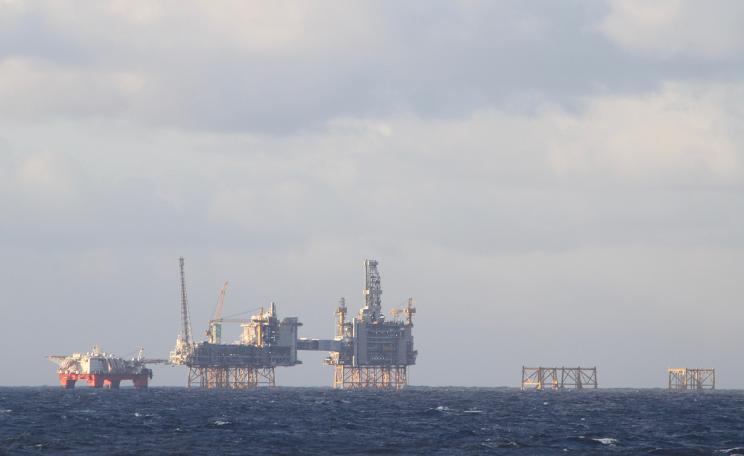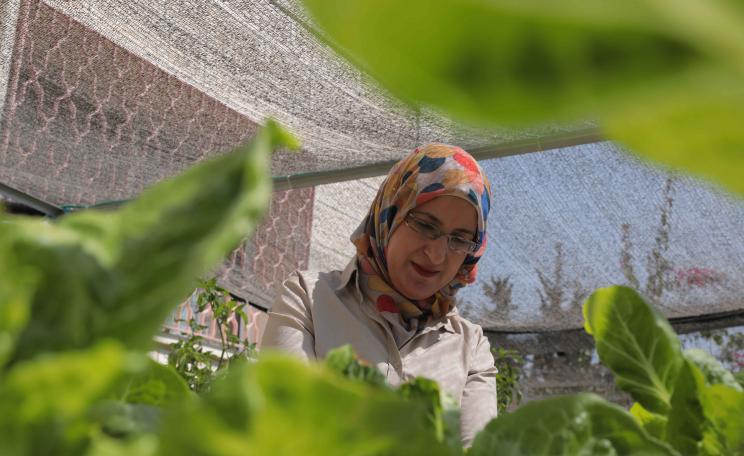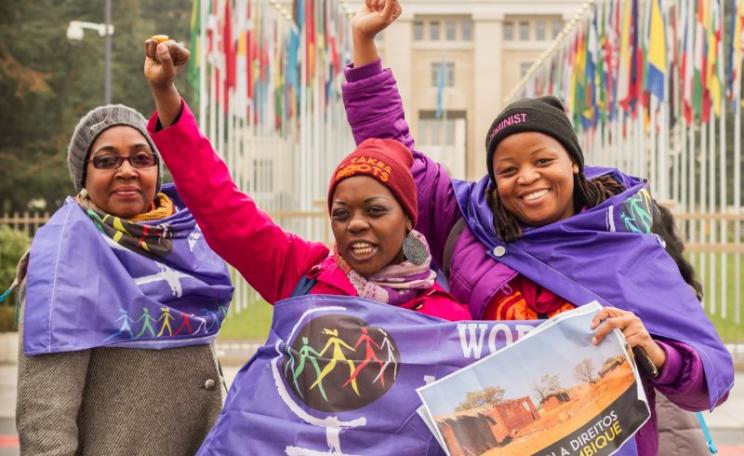-
The first thing that hits you is the stench of crude oil that pervades the air. The van slowly negotiates the potholes in the path, allowing us to take in the reality of the oil-drenched puddles we splash through.
We are on the ground with Environmental Rights Action/Friends of the Earth Nigeria, inspecting the state of the clean up at a few of the sites affected by oil spills in the Niger Delta.
Between 1976 and 1991, over two million barrels of oil polluted Ogoniland in 2,976 separate oil spills.
Corporate impunity
It's been more than 23 years since Ken Saro Wiwa and eight other Ogoni leaders were executed by the Nigerian government for standing up to Shell's operations in their communities.
Four Nigerian farmers and Friends of the Earth Netherlands launched a court case against Shell in the Netherlands more than a decade ago, intending to hold the company to account for its destruction of the Niger Delta.
While oil production has ceased, pipelines operated by Shell still traverse the land, creeks and waterways. Leakages – caused by corroded pipelines as well as bandits – mean that the area is still plagued by oil spills.
It is a painful example of corporate impunity that even when the tireless work of communities, individuals and campaigners achieves some semblance of justice, it is rarely seen through.
Nowhere is this more true than for the Ogoni people in the Niger Delta.
Demanding accountability
Michael Karikpo, from Environmental Rights Action explains to us: “The price for docility in our communities and country is the loss of liberty and sovereignty to rapacious and predatory multinational oil companies like Shell.
"Our communities must stand up and continuously demand accountability from Shell and the international system that nurtures it.”
The horror of the vast stretch of black, lifeless landscape stretching out in front of us is something that has to be seen in order to be believed. Justice has clearly not been served in the Niger Delta.
We are overlooking Kidaro Creek in Kegbara Dere. The landscape has been utterly devastated by oil spills in 2008, 2009 and 2014.
The intense brightness of the sun blinds you to the ghastly yet beautiful patterns of the oil – coiling and sweeping across the surface of the water – until you are close up.
Comprehensive cleanup
In 2011, the United Nations Environment Programme (UNEP) released a damning environmental assessment of Ogoniland exposing extensive oil pollution and severe health risks including polluted drinking water.
The report prescribed a comprehensive cleanup of Ogoniland and recommended, in line with Environmental Guidelines and Standards for the Petroleum Industry in Nigeria (EGASPIN), that Shell clean up every oil spill, no matter the cause.
It also recommended the establishment of an Ogoniland Environmental Restoration Authority and Fund, with an initial capital of US$1 billion.
The Hydrocarbon Pollution Remediation Project (HYPREP) has been established to undertake the clean up, but progress has been painfully slow.
The community has tried every possible avenue in its search for justice, including local, national and international courts and political institutions.
Existing regulations
So why has Shell not taken action here? Local environmental scientist Eraks Kobah provides a heartbreaking answer: “Kidaro Creek was not mentioned in the original report and has thus been ignored by the oil company.
“There has been no study on this place. And if it is not taken care of, those who benefit from this environment – like the local fishermen – will continue to suffer the effects of the devastation.”
Eraks grew up near the creek. “Generations of my family have fished in this creek, that was how we were able to sustain ourselves. The generation that is coming up today can’t enjoy the opportunities and privileges I enjoyed. I am sad to see that happening.
“Shell has been so irresponsible. They are supposed to clean every oil spill, no matter the source. It’s high time Shell changed its behavior and complied with existing regulations.”
Our visit convinced us that the Ogoni people are doing everything they can to be heard and to instigate action. It is a David versus Goliath struggle, of the Ogoni people versus Shell.
Eraks left us with a message for the international community, which was one we were to hear again and again during our visit: “It is important that the international community assist us, by sending the message that this place must be properly remediated so that local people can continue to benefit from their environment.”
Delaying compensation
Chief Sunday Kpai is from K-Dere, whose lands have been ravaged by Shell's activities for decades. He said: “I hope and I pray every day that I will be alive when they eventually pay.”
Chief Sunday Kpai is over 100 years old, and still waiting for the US$37.8 million compensation granted to him by a Nigerian court in 2015. Shell has appealed this judgement.
Chief Sunday is not optimistic about the settlement: “The only reason Shell is appealing is that they know we will all die eventually. So they are waiting for us all to die.
"We did not do anything to Shell, yet they have destroyed our inheritance. If I die now, what is the relevance of the court? Who will get the money? The whole of this area is contaminated. Is this how we must live and survive in the world?”
Chief Sunday closed with a plea to the international community: “Please do whatever you are able to do to expose the way Shell is treating us.”
Contaminated water
We continue through barren landscapes punctuated by abandoned equipment and rusty pipes, some of them still oozing oil.
We stop by Nwekol also known as Bomu oil well 1, the site of the first oil well in Ogoniland, where we meet Biakpor Gberesu, the daughter of the local community founder: “The crude has an effect on the crops: when you plant cassava, it is going to die. So we are suffering, we are hungry. There is nothing to feed on here.”
The first of the area's 52 oil wells was built in 1958. It started spilling oil in the 1990s, but was not repaired for 15 years. Further devastation followed with a major fire in 2009. Shell has turned a blind eye to it all.
The spills have contaminated the local water, and Shell failed to provide an alternative drinking supply.
Biakpor Gberesu explained that the community suffer from “coughs, malaria, typhoid.” Her efforts to draw attention to the community's health and environment have not been successful: “I have told Shell several times, but they don’t want to answer me.”
Bodo village
Bodo village sits on the coast of the Niger Delta, but despite access to the sea, oil residues swirl across the surface of the water.
We meet Chief Saint Emma Pii who confirmed that oil spills in 2008 and 2009: “totally destroyed the environment for agriculture and fishing. The whole ecosystem was destroyed.”
He takes us to the river banks, where abandoned wooden fishing boats are slowly sinking into the oily mud: “This place was our livelihood, we fished and traded from here. This was a living place.”
Pii gestures to the horizon: “All of these? What you see were mangroves, living mangroves. Before the spills, animals were living here: lizards, even lions and elephants.”
“We are refugees in our community. Hungry is our name. We can’t eat what we plant. We don’t have a future. Our children die young. Babies are premature. People die early.”
Livelihoods and empowerment
In 2012, the Bodo community filed a case in the United Kingdom, where Shell is incorporated. After years of negotiating, the community settled in 2015 for US$83.4 million, a whopping 82 percent short of their original demand of US$454.9 million.
Nonetheless, this is one of the largest such compensation payments to impacted communities in Africa, and it is hoped that it will open the door to additional claims.
Under the 2015 UK settlement, Shell is responsible for cleaning up this area. But Shell sought a court order to prevent community members from reviving the litigation if the clean up is not carried out satisfactorily. Shell's attempt to silence the community were shut down in the UK courts in 2018.
Chief Saint Emmah Pii said: “The environment belongs to all of us. These spills have destroyed everything: our livelihoods and our empowerment. My cry, my grievance, my agony is for those who are growing up.” We replied: “How can we help?”
Pii continued: “My message for Shell is that they have destroyed our environment. We have nowhere to go. We have no means of livelihood. Please, in the name of God, let them come and return the land to its normal state.”
Young people
Michael B Rejoice, an 18-year-old woman living in Bodo, told us how she and other young people have been suffering from the day they were born: “The oil spillage has affected us, the children, a lot. It has affected our eyes. We can’t look at our books and read as well as we ought to.
"It has also affected our health. The girl's school in my community is located near the river. If you go there you can’t breathe very well. You breathe in this oil.”
Children in the Niger Delta grow up drinking, cooking and washing with polluted water. They eat contaminated fish and vegetables. They suffer from breathing problems. A 2017 studyshowed that babies in Nigeria were twice as likely to die in the first month of life if their mothers were living near an oil spill before becoming pregnant.
Michael B Rejoice is determined to improve the future for others in her community: “I would like to be a mass communicator because I would like to tell the whole world about our environment, how to keep it clean so we won’t be affected by illness.” And what about Shell?
“I beg Shell to help us. To come and clean up our river so that the fish can come back. And [clean up] the oil that has gone deep into our soil.”
Insult to injury
As we walk around Bodo village, the irony of a plaque "commemorating the official launch of the oil spill clean up in Ogoniland” is not lost on anyone.
Although the plaque is dated June 2016, it overlooks decimated mangroves and water ways, with no evidence of clean up in sight.
To add insult to injury, a road currently under construction to service the oil industry dissects Bodo City and cuts off the community's access to the creek, exasperating any natural cleaning process that might occur through tidal movement.
Further down the coast, we talk to Eric Dooh of the Goi community, also awaiting compensation for the impacts of three spills in 2008: “We had a college here, we had poultry, a bakery, fish farms, canoes that we used for deep sea fishing. Nearly everything has been grounded. There has been no compensation, nothing.”
The community has witnessed the gradual decline of their natural environment and the loss of local people's food sovereignty.
Polluted environment
Dooh continued: “This water used to be full of big, big fish. How do we survive? The little fish here are polluted. Our people eat polluted fish, we drink polluted water, we inhale polluted air, we feed on polluted food, and we live in a polluted environment.”
We watch a young boy with a net searching for fish in a tributary. “This is pathetic. You can see how they have been struggling and struggling. Did you see any fish in that net? No fish.
"But there is no other option. You will see them coming here every day to scavenge the area so that they can sustain their families.”
Eric Dooh’s father, Chief Barizaa Dooh, was one of four Nigerian farmers who took Shell to court in the Netherlands in 2008, together with Milieudefensie/Friends of the Earth Netherlands.
In 2013, Shell was convicted for damages in Ikot Ada Udo but not in Goi. Following the death of his father, Eric Dooh took his father’s place in the appeal procedure.
Transient profits
In 2014, Friends of the Earth Netherlands discovered through documents released in a UK court case that Shell had lied in court; the company's internal documents stated that the pipeline in Goi was poorly maintained and inadequately monitored.
Today, the lawsuit in the Netherlands is ongoing, with Shell blocking justice every step of the way.
Driving through Port Harcourt, it is hard not to think of all of the money that is generated in the Niger Delta - transient profits, that leave nothing but stench, misery and destruction behind for the local people.
At the end of our brief journey through the Niger Delta, we felt the privilege of being able to leave and return to a world where the reality of our addiction to fossil fuels, which is the single biggest cause of the global climate crisis, is largely hidden from view.
But we need to be reminded of this every day until Shell is held to account and the Ogoni communities receive justice, for the sake of the climateas well as the people of the Niger Delta.
We are taking the fight to the United Nations where we are working on a new UN human rights treaty, which aims to establish new and binding rules for transnational corporations.
Get involved
This year, governments will negotiate a draft text to address the gap in international law and bring justice to victims of translational corporate crimes, like those in Nigeria. You can follow our work on a UN Binding Treaty.
Join our legal case to #StopShell: There are currently over 1,000 climate litigation suits around the world. Friends of the Earth Netherlands launched a historic legal action against Shell for causing climate change in 2019and you can support this case by signing our petition.
Follow Environmental Rights Action/Friends of the Earth Nigeria, who are doing inspiring work with youth on renewable energy. They are challenging the long held belief that the only way for Nigerians to make it big and escape the clutches of poverty is through the oil and gas industry, both legitimate and illegitimate (such as artisanal oil refining and oil theft).
As Michael Karikpo explained: “We want to show that there is a world of opportunities out there if they stay in school, study and think about energy solutions that would not bring the level of devastation and pollution that stalks them and their communities on a daily basis.
"Our overarching goal is to have one or more of the students we introduce these ideas to develop the clean, renewable, environmentally friendly energy of the future that will address global warming but make energy accessible to all as a basic right.”
This Author
Amelia Collins is communication coordination at Friends of the Earth International. A Friends of the Earth International team visited the Niger Delta in November 2018.
Image: © Amelia Collins/Friends of the Earth International.





